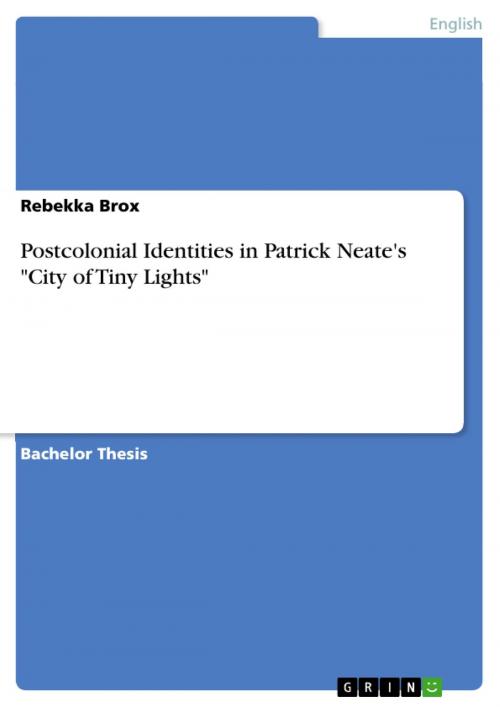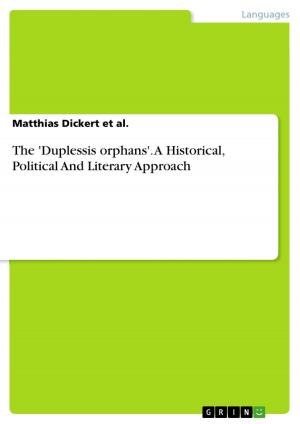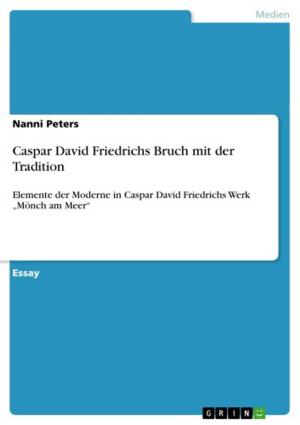Postcolonial Identities in Patrick Neate's 'City of Tiny Lights'
Fiction & Literature, Literary Theory & Criticism, British| Author: | Rebekka Brox | ISBN: | 9783640506910 |
| Publisher: | GRIN Verlag | Publication: | January 11, 2010 |
| Imprint: | GRIN Verlag | Language: | English |
| Author: | Rebekka Brox |
| ISBN: | 9783640506910 |
| Publisher: | GRIN Verlag |
| Publication: | January 11, 2010 |
| Imprint: | GRIN Verlag |
| Language: | English |
Bachelor Thesis from the year 2009 in the subject English Language and Literature Studies - Literature, grade: 1,3, University of Tubingen (Englisches Seminar), language: English, abstract: Firstly, this paper focuses on Farzad and his self as a 'contrary geezer'. As a first step it is analysed in what respect Farzad can be described as a man living in diaspora. Subsequently, it is shown what special position Uganda acquires in his life. By applying Salman Rushdie's theory of imaginary homelands the paper demonstrates how Farzad uses imagination in order to cross space and time to return to his deceased wife. The means for this return are alcohol and painting. The latter is examined in more detail showing its significance for Farzad's life. Finally, Farzad's obsession for cricket and its implications are interpreted. Secondly, the character of Gundappa is introduced who has quite a peculiar way of dealing with his identity issue. It is shown what massive effect the death of his mother has on him and his self-perception and how this finally leads to the abandonment of his real identity. It is analysed how and why he he starts disguising as someone who he is not and creates several new identities. Thirdly, the paper has a closer look on the main protagonist Tommy. This part starts out with Tommy's time as a terrorist showing how the death of his mother led to a similar but slightly different reaction as the one of his brother Gundappa and how he ends up being a man without an identity. Furthermore, the recurring flashbacks are analysed with special attention to his distanced relationship to this time as a soldier of the Mujahideen. It is depicted in what respect this still influences his life. Next, it is described how he regains and accepts his identity. Applying postcolonial scholar Homi K. Bhaba's theories of 'living in-between' and mimicry to Tommy it is shown how he realises that he will never be regarded as a pure Englishman by society. Instead, he accepts the multitude of cultures that influence his identity and finds himself living at the border of different cultures shuttling from one to the other and using the possibilities that this shuttling between cultures offers. As a further step this theory of living at a border is transferred to his occupation as private investigator. Furthermore, the influence that his ethnicity has on his occupation is examined and whether he can sustain his aspiration of acting in the tradition of Chandler's crime novel figure Philip Marlowe. Finally, Tommy's language is considered as a means of expressing identity.
Bachelor Thesis from the year 2009 in the subject English Language and Literature Studies - Literature, grade: 1,3, University of Tubingen (Englisches Seminar), language: English, abstract: Firstly, this paper focuses on Farzad and his self as a 'contrary geezer'. As a first step it is analysed in what respect Farzad can be described as a man living in diaspora. Subsequently, it is shown what special position Uganda acquires in his life. By applying Salman Rushdie's theory of imaginary homelands the paper demonstrates how Farzad uses imagination in order to cross space and time to return to his deceased wife. The means for this return are alcohol and painting. The latter is examined in more detail showing its significance for Farzad's life. Finally, Farzad's obsession for cricket and its implications are interpreted. Secondly, the character of Gundappa is introduced who has quite a peculiar way of dealing with his identity issue. It is shown what massive effect the death of his mother has on him and his self-perception and how this finally leads to the abandonment of his real identity. It is analysed how and why he he starts disguising as someone who he is not and creates several new identities. Thirdly, the paper has a closer look on the main protagonist Tommy. This part starts out with Tommy's time as a terrorist showing how the death of his mother led to a similar but slightly different reaction as the one of his brother Gundappa and how he ends up being a man without an identity. Furthermore, the recurring flashbacks are analysed with special attention to his distanced relationship to this time as a soldier of the Mujahideen. It is depicted in what respect this still influences his life. Next, it is described how he regains and accepts his identity. Applying postcolonial scholar Homi K. Bhaba's theories of 'living in-between' and mimicry to Tommy it is shown how he realises that he will never be regarded as a pure Englishman by society. Instead, he accepts the multitude of cultures that influence his identity and finds himself living at the border of different cultures shuttling from one to the other and using the possibilities that this shuttling between cultures offers. As a further step this theory of living at a border is transferred to his occupation as private investigator. Furthermore, the influence that his ethnicity has on his occupation is examined and whether he can sustain his aspiration of acting in the tradition of Chandler's crime novel figure Philip Marlowe. Finally, Tommy's language is considered as a means of expressing identity.















